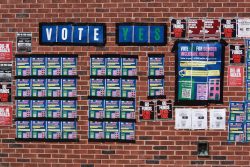As Georgetown prepared for Homecoming last week, students in University-owned townhouses received an unsettling message from the Office of Residence Life. Not only would the Metropolitan Police Department be out in full force over the weekend, the message said, but police would have the power to issued 61-Ds—citations for excessive noise that include a fine and show up as arrests on criminal records. More ominously, the e-mail revealed that MPD has already issued six 61-D citations since the start of the academic year.
While it is heartening that none were issued last year, according to the e-mail, the fact that MPD handed out at least six 61-Ds over four weeks is disconcerting.
Saddling students with arrest records right before they enter the job market, just because they threw an out-of-control party, is unconscionably harsh. Nina Pillard, a professor of labor and employment law at the Georgetown Law Center, told the Voice earlier this year that having an arrest record—even just for a noise violation—could be a serious impediment to securing a job.
“Given two otherwise comparable candidates, a lot of employers steer clear of arrestees,” Pillard said.
Compassionate neighbors should be mindful of these consequences when they think of calling MPD. Instead, they should ask party hosts directly to bring down the volume or call the Student Neighborhood Action Program (SNAP), a hotline run by the University for neighbors’ complaints.
While a call to SNAP can result in fines and other disciplinary consequences, at least it won’t leave students with permanent blots on their record.
Students can reduce their chances of earning 61-Ds by alerting their neighbors when they plan to host a party and giving neighbors their phone numbers so that they can be contacted if the party becomes too loud. They should also express the penalties associated with 61-D citations so that residents are aware of just how damaging a visit from MPD can be.
The University should be fighting to defend students by encouraging neighbors to use less punitive tactics in response to noise and lobbying MPD to stop issuing the recently revived 61-Ds.
Georgetown students, administrators, and permanent residents have long squabbled over appropriate noise levels for off-campus parties, but hopefully all groups can recognize that inflicting arrest records on students for throwing parties is unduly harsh.
Arrest-to-noise ratio unfair to GU
By the Editorial Board
October 1, 2009





MPD should not be faulted for enforcing reasonable restrictions on noise at late hours. This is a question of individual responsibility, and students should be prepared to face the consequences of their actions. Asking MPD to not do their job because it might affect a student down the road is unreasonable; if we followed that logic, no one would be arrested for anything.
How are we to have any credibility with our neighbors if we not only continue to break the law and disturb others, but also attempt to shirk responsibility for our actions?
More arrests and 61Ds are coming this year.
Public urination, possession of open containers, disorderly conduct will be enforced. Violators will be arrested like never before. Compliments of the residents.
Good luck kids. This year’s class may have the record for arrests.
GU should make sure that students understand that they will be treated like everyone else.
Let me make sure I understand this:
1) The university should amend its alcohol policy to make it more liberal,
2) MPD shouldn’t arrest students for DIP and disturbing the peace because it will keep you from getting jobs,
3) John Q. Pierce needs to step it up a bit because you are busy.
At what point are you responsible for your own behavior?
If you are under 21, don’t drink.
If you have a party, think of the neighbors BEFORE you do something stupid.
Plan ahead when it comes to your schedule, and if GW is more efficient, transfer.
College is not an extended Pre-K. You are responsible for your actions, and if you are in violation of the law, then you should be pay the consequences.